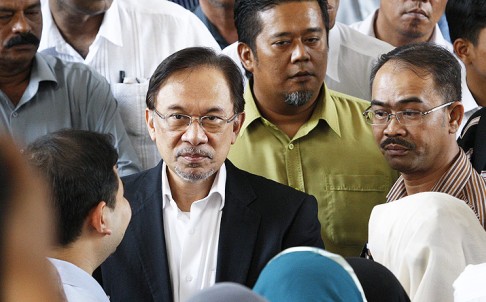Malaysian opposition leader Anwar Ibrahim’s sodomy acquittal overturned
PUBLISHED : Friday, 07 March, 2014, 5:30pm
UPDATED : Friday, 07 March, 2014, 10:54pm
Reuters in Putrajaya

Malaysian Opposition leader Anwar Ibrahim (centre) talks with his supporters in Putrajaya, outside Kuala Lumpur, Malaysia, on Friday. Photo: EPA
Malaysian opposition leader Anwar Ibrahim had his acquittal for sodomy overturned on Friday, in a fresh threat to the remarkable career of a charismatic politician who helped turn around the country’s once-hapless opposition.
A Court of Appeals panel upheld a government bid challenging the 2012 ruling which acquitted him on charges he sodomised a male former aide, saying a lower court had misjudged evidence.
Anwar, 66, was sentenced to five years in jail, but freed pending appeal.
Once a rising star in Malaysia’s long-ruling party until his spectacular ouster in the late 1990s, Anwar has alleged a long-running campaign by the ruling regime to destroy his political career with false charges.
He bitterly chastised the judges after the ruling.
“It is a travesty of justice. I would have thought you would have some courage,” he said to the panel.
Friday’s ruling sparked an uproar in a courtroom filled with Anwar’s opposition colleagues and supporters, as his wife and three daughters burst into tears.
Dozens of Anwar supporters demonstrated outside the appeals court in the administrative capital of Putrajaya after the announcement, chanting “Reformasi” (Reform), as a heavy police presence ringed the building.
Sodomy is illegal in Muslim-majority Malaysia and punishable by up to 20 years in jail.
Anwar plans to appeal to the Federal Court, Malaysia’s highest. If that fails, he would also be stripped of his parliament seat, effectively dumping him as leader of the opposition.

“All over again, after 15 years, they want to put me in the lockup and that is why they are rushing,” Anwar said.
A charismatic campaigner and speaker, Anwar reached the pinnacle of the powerful United Malays National Organisation (UMNO), Malaysia’s ruling party, in the 1990s.
As deputy prime minister, he was in line to take power but was felled in a 1998, power struggle with then-ruler Mahathir Mohamad.
Anwar was ousted, beaten and jailed on sodomy and corruption charges widely viewed as trumped-up.
The stunning fall from grace was widely seen both at home and abroad as politically motivated and triggered massive protests in a country where dissent is suppressed.
He spent six years in prison until his 2004 release.
The latest charges were first brought by the government after Anwar united a disparate opposition and led it to what was then its best-ever showing in 2008 polls.
The opposition alliance did even better last year, shockingly winning the popular vote in general elections, though failing to gain control of parliament due to decades of gerrymandering by UMNO.
Anwar has called the drawn-out sodomy trial and subsequent appeal an attempt by a fearful ruling regime to halt the opposition’s advance.
He was acquitted in January 2012, but the three-man appeals bench said the lower court failed to properly handle evidence.
“This trial was all about knocking Anwar Ibrahim out of politics and the government was prepared to do whatever it took to make that happen,” said Phil Robertson, deputy Asia director for Human Rights Watch, said in a statement.
The government of Prime Minister Najib Razak has previously denied such allegations.
The ruling triggered condemnation on social media by supporters of Anwar’s party, many of whom called for street protests.
The timing of the long-delayed appeal decision has raised eyebrows, coming just as Anwar plans to contest a by-election in the key central state of Selangor surrounding the capital on March 23.
He was expected to win and subsequently be made boss of the state, Malaysia’s richest, in a bid to further boost his and the opposition’s clout.
But the conviction disqualifies him from contesting.
